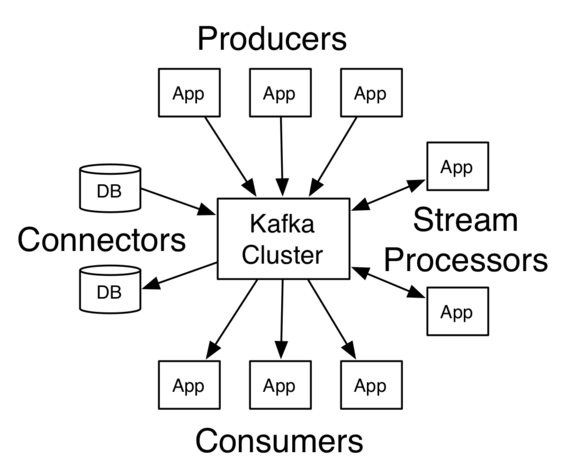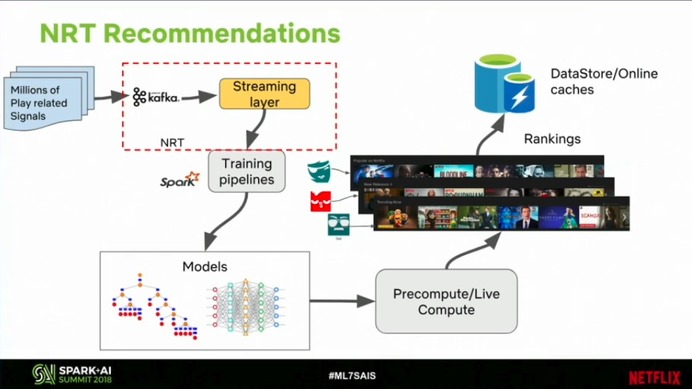Real-time Applications of Machine Learning with Apache Kafka
Sanam Malhotra | 27th December 2019

Artificial intelligence (AI) is defying rule-based programming with expansive machine learning opportunities. As an emerging AI development company, Oodles AI is constantly exploring AI technologies to build powerful and business-oriented machine learning models.
In this article, we are exploring the distributed streaming platform, Apache Kafka, that is gaining momentum among global digital businesses. Developed as a big data messaging platform, Kafka is now fulfilling the machine learning requirements of businesses with dynamic data processing capabilities. We have highlighted the most effective real-time applications of machine learning with Apache Kafka to automate business operations significantly.
Understanding Kafka and its Significance
Apache Kafka is an open-source distributed event streaming platform that facilitates storing, streaming and processing of real-time data. It was initiated by Linkedin in 2011 as a messaging queue that eventually transformed into a mainstream evert-streaming platform.
Today, more than 30% of the Fortune 500 companies use Apache Kafka including Uber, Airbnb, LinkedIn, Spotify, PayPal, etc.
Machine learning (ML) and Kafka together enable businesses to develop scalable analytical models that use real-time data streams of records. For this, Kafka runs in a cluster (Kafka Cluster) and provides five major APIs namely, Producer, Consumer, Streams, Connect, and Admin API.

Below are some benefits of building machine learning models with Apache Kafka-
a) Kafka serves as a central nervous system for ML models and creates a simplified data pipeline for training and analytics purposes.
b) Kafka enables businesses to channelize large volumes of real-time data ormachine learning with Apache Kafkamachine learning with Apache Kafka batches.
c) Kafka’s ecosystem supports a high-performing and scalable platform to develop business-critical projects.
d) Kafka’s infrastructure comes with high-throughput, low-latency, and maximum fault-tolerant advantages that enable businesses to build persistent and reliable ML models.
Business Applications of Machine Learning with Apache Kafka
1) Stream Processing for near Real-time Recommendations
We are in the age of personalization wherein personalized web content is deriving maximum customer loyalty. However, traditional batch processing methodologies are turning redundant due to high-latency and limited bandwidth issues that unable businesses to channelize large datasets.
With Apache Kafka, businesses are now able to exercise advanced machine learning development services to process real-time data streams. Kafka’s light-weight stream processing library called Kafka Streams enables businesses to provide near real-time (NRT) recommendations in the following manner-
a) ML models using Kafka collect and process customer interactions, impressions, content popularity metrics, attribution, and metadata to analyze consumer interests.
b) The system then processes the collected data in a step-by-step manner to provide personalized and timely recommendations for customers. Kafka’s high-throughput and long durability makes for a reliable platform that can be used across video streaming, eCommerce, and other businesses.

Here’s how Netflix uses Kafka along with Spark to run its NRT video recommendation system.
Also read- How eCommerce can harness Deep Learning for Recommendation Systems
2) Website Activity Tracking for Real-time Analytics
A majority of organizations are adopting big data analytics to extract valuable insights that strengthen their decision-making processes. Besides accurate recommendations, Kafka’s data processing capabilities can be used to monitor real-time activities over complex business websites.
Here’s how Kafka is able to handle user activity tracking pipeline-
a) Site activities such as page views, searches, preferred content, and other user actions are published to central topics of any website.
b) Kafka’s Streams API can then store and distribute the published content across applications and systems to deliver to users in real-time.
c) Businesses with minimum hardware infrastructure can process high volumes of website activity with Kafka for real-time analytics and business intelligence.
Also read- Innovative TensorFlow Applications for Machine Learning Models
How does Oodles AI practice Machine Learning with Apache Kafka?
Oodles’ artificial intelligence team has hands-on experience in building and deploying machine learning models for multiple-industry businesses. Our AI capabilities include personalized recommendation systems, predictive analytics, natural language processing systems, and computer vision development services.
Our team has a working knowledge of deploying Apache Kafka for the following business applications-
a) Personalized recommendations for eCommerce, video streaming, and new reporting businesses. We use comprehensive machine learning libraries such as TensorFlow and OpenCV and Kafka’s Stream library to power stream processing.
b) Big Data Analytics with scalable bandwidth to handle large datasets for data modeling, reporting, and visualization using technologies like Hadoop and Spark.
Reach out to our AI team to learn more about our artificial intelligence services.



